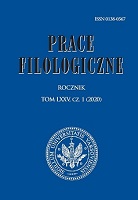Walencja odczasownikowych nazw wykonawców czynności
The valency of deverbal nomina agentis
Author(s): Krystyna KleszczowaSubject(s): Morphology, Lexis, Western Slavic Languages, Philology
Published by: Wydział Polonistyki Uniwersytetu Warszawskiego
Keywords: word formation; obligatory collocability; blocking of collocability;
Summary/Abstract: The collocability of deverbal words manifests their status within the category of nomina agentis. A derived word may be an element of a specific description, indicating the referent in a direct manner (odkrywca Ameryki ‘the one who discovered America’= Christopher Columbus; twórca Facebooka ‘the creator of Facebook’ = Mark Elliot Zuckerberg). A separate class is constituted by the names that specify the final value of the verb, thus acquiring a sense of singularity: odkrywca penicyliny ‘the one who discovered penicillin’ (Alexander Fleming), twórca Symfonii patetycznej ‘the author of Symphony No. 6 in B minor’ (Pyotr Tschaikovski). However, the majority of names point to the items determined by a specific context or consituation. This obviously does not mean that such an item should stand by an agentive name, cf. Jeżeli komuś sprzedaję obraz, to nabywca[obrazu] otrzymuje gwarancję trwałości mojego wyrobu. The names of professions usually block the indication of the object of the activity, if only it is inscribed into the meaning of the derived word (we do not say *piekarz chleba ‘*the baker of bread’, etc.). However, surface objects can also be blocked – for different reasons – when accompanying the names of people who demonstrate particular proclivities or skills (rozrabiacz, majsterkowicz, szperacz). Since names like these refer to generalised objects, the indication of one element of the set yields an unacceptable expression, cf. *majsterkowicz samochodzików, *żarłok kotletów, *pijak piwa.The form of the object of the activity, appearing next to the derived word, is usually constant - these are nouns in the genitive case, even if they had a different form in the past (dative and instrumental cases).
Journal: Prace Filologiczne
- Issue Year: 75/2020
- Issue No: 1
- Page Range: 283-292
- Page Count: 10
- Language: Polish

